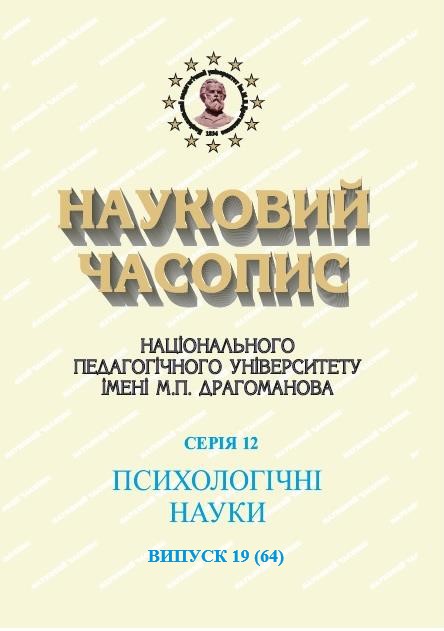PSYCHOLOGICAL FEATURES OF PERSONAL CHARACTERISTICS OF TEACHERS WITH EMOTIONAL BURNOUT
DOI:
https://doi.org/10.31392/NPU-nc.series12.2022.19(64).06Keywords:
emotional burnout, stress, resistance, exhaustion, personal characteristics, professional orientation.Abstract
Objective. The article reveals the determination of psychological features of personal properties among teachers of different professional orientation with emotional burnout. Research methods: theoretical (analysis, comparison, generalization, interpretation of theoretical approaches and empirical research); empirical (testing); methods of mathematical statistics (to identify differences in the psychological characteristics of personal traits of teachers with emotional burnout, the Mann-Whitney U-criterion was used). Calculations were performed using SPSS v.17 software. Results. It was determined that for the general sample of teachers the most pronounced component of the emotional burnout syndrome is the reduction of personal achievements, and emotional exhaustion, on the contrary, has a rather low degree of expression. Conclusions: 1. It has been established that in the general sample of the subjects, the syndrome of emotional burnout is at the stage of formation. The resistance phase is more established compared to the stress and exhaustion phases. The dominant components of emotional burnout syndrome are symptoms of inadequate selective emotional response and reduction of professional responsibilities. It is also important to note that for the general sample of teachers, the most pronounced component of emotional burnout syndrome is the reduction of personal achievements, while emotional exhaustion, on the contrary, has a rather low degree of expression. In teachers of natural-mathematical cycle, emotional exhaustion is expressed at a high level of formation in the majority of teachers in comparison with teachers of social and humanitarian cycle. 2. Almost all variables of personality traits of the respondents have an average level of formation. But the indicators of communicative speed and psychomotor plasticity have a high level of formation in the sample of teachers of natural and mathematical cycle. Such variables as communicative speed and intellectual emotionality of a high level of formation were revealed in teachers of the social and humanitarian cycle. It is determined that high levels of formation, according to such variables of personal properties of the researched as psychomotor plasticity, communicative speed, intellectual emotionality are more sensitive to the detection of emotional burnout of teachers of different professional orientation.
References
- Beshchuk-Venherska, N.V. (2015). Profilaktyka syndromu profesiinoho vyhorannia u pedahohiv [Prevention of professional burnout syndrome in teachers]. Vinnytsia : MMK. Retrieved from https://dorobok.edu.vn.ua/article/pdf/1257 [in Ukrainian].
- Kirieieva, L.R. (2011). Teoretychnyi analiz problemy emotsiinoho vyhorannia vchytelia v protsesi yoho profesiinoho stanovlennia [Theoretical analysis of the problem of emotional burnout of a teacher in the process of his professional development]. Visnyk natsionalnoho universytetu oborony Ukrainy – Bulletin of the National University of Defense of Ukraine, 5, 135–140 [in Ukrainian].
- Perepeliuk, T.D., & Kudelia, I.S. (2019). Psykholohichni osoblyvosti profesiinoho vyhorannia vchytelia serednoi shkoly. aktualni problemy psykholohii [Psychological features of professional burnout of a secondary school teacher]. Zbirnyk naukovykh prats Instytutu psykholohii imeni H.S. Kostiuka NAPN Ukrainy – Actual problems of psychology: Collection of scientific works of the Institute of Psychology named after H.S. Kostyuk of the National Academy of Sciences of Ukraine, ХI(19), 381–395 [in Ukrainian].
- Tsimbalyak, І.M. (2005). Psikhologіchne konsul'tuvannya ta korektsіya. Modul'no-reitingovii kurs. Navchal'nii posіbnik [Psychological counseling and correction. Modular rating course]. Kyiv : VD «Profesіonal [in Ukrainian].
- Shpychak, I.P. (2017). Poperedzhennia emotsiinoho vyhorannia pedahohiv [Special course. Prevention of emotional burnout of teachers]. (с. 7–28). Rivne : ROIPPO [in Ukrainian].
- AbuMadini M.S, & Sakthivel, (2018). Comparative study to determine the ccupational stress level and professional burnout in special school teachers working in private and government schools. Global Journal of Health Science, 10(3), 42–53. https://doi.org/10.5539/gjhs.v10n3p42
- Hemati Alamdarloo, G., & Moradi, S. (2021). Job Burnout in Public and Special School Teachers. Clinical Psychology and Special Education, 10(2), 63–75. https://doi.org/10.17759/cpse.2021100205
- Рopov, S., Latovljev, M., & Nedić, A. (2015). Burnout in health care and education workers: The role of situational and individual factors. Psihološka istraživanja, 18(1), 5–22. https: // org /10.5937 /PsIstra 150100
- Gluschkoff, K., Elovainio, M., & Kinnunen, U. (2016). Work stress, poor recovery and burnout in teachers. Occupational Medicine, 66(7), 564–570. https://doi.org/10.1093/occmed/kqw086.
- Williams, J., & Dikes, C. (2015). The implications of demographic variables as related to burnout among a sample of special education teachers. Education, 135(3), 337–345. https://doi.org/10.5937/PsIstra1501005

